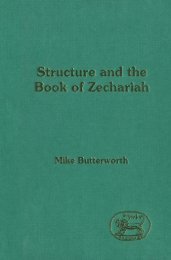Appendix CASE ONE - Collection Point® | The Total Digital Asset ...
Appendix CASE ONE - Collection Point® | The Total Digital Asset ...
Appendix CASE ONE - Collection Point® | The Total Digital Asset ...
Create successful ePaper yourself
Turn your PDF publications into a flip-book with our unique Google optimized e-Paper software.
<strong>The</strong> Influence of Butch Cassidy on English Company Law 175<br />
a mere unincorporated association but a registered company. It was therefore<br />
constituted by its Memorandum and Articles of Association and governed by<br />
the Companies Acts. <strong>The</strong> Articles of Association of the Kent or Romney<br />
Marsh Sheep Breeders' Association contained a provision, in Article 49, that<br />
all disputes between the Association and any member would be referred to<br />
arbitration. Now the Arbitration Act 1889 provided in effect that, if the<br />
parties to a dispute had entered into a 'written agreement' to submit such<br />
disputes to arbitration, then they could not bring an action in court about<br />
that dispute without going first to arbitration. <strong>The</strong> Association argued that<br />
Article 49 of their Articles of Association was such an agreement between<br />
them and Hickman and that therefore these Chancery proceedings must be<br />
stayed and Hickman must go to arbitration. Hickman argued that the Articles<br />
of Association were not an agreement between him and the Association and<br />
therefore he had not entered into an agreement to go to arbitration and<br />
the court could not stay these proceedings. <strong>The</strong> issue therefore became the<br />
apparently straightforward one: do the articles of association of a company<br />
constitute an agreement between the members and the company?<br />
<strong>The</strong> problem that Hickman had to settle concerned the relationship between<br />
a company and its shareholders and, in particular, what is known as the<br />
statutory contract, which used to appear in s. 20 of the Companies Act 1948<br />
and now appears in s. 14 of the Companies Act 1985. <strong>The</strong> wording of this<br />
section has not changed much since it first appeared in the Companies Act<br />
1856. At the time of Hickman the relevant words were in the Companies<br />
(Consolidation) Act 1908, s. 14(1) and read as follows:<br />
<strong>The</strong> memorandum and articles shall, when registered, bind the company and<br />
the members thereof to the same extent and as if they had respectively been<br />
signed and sealed by each member, and contained covenants on the part of each<br />
member, his heirs, executors and administrators, to observe all the provisions of<br />
the memorandum and of the articles, subject to the provisions of this Act.<br />
<strong>The</strong> problem which this provision creates is whether or not it has the effect<br />
of creating a contract between the members inter se and a contract between<br />
each member and the company. In 1937 Lord Greene admitted, in Beattie<br />
v. E. and F. Beattie Ltd., 4 that this provision had proved controversial<br />
in the past and was likely to continue to be controversial in the future.<br />
<strong>The</strong> origins of the controversy are not difficult to trace. Because of the<br />
restrictions imposed by the Bubble Act, many business organizations were set<br />
up under deeds of settlement. Almost invariably an indenture, incorporating<br />
the association's constitution, was executed by every member and the trustees<br />
of the association. <strong>The</strong>refore there was no problem in identifying the parties<br />
to the contract: the indentures established the contract between the members<br />
and the association. When incorporation by mere registration became possible<br />
under the Companies Act 1844, the problem still did not arise for that Act<br />
4 [1938] Ch. 708






